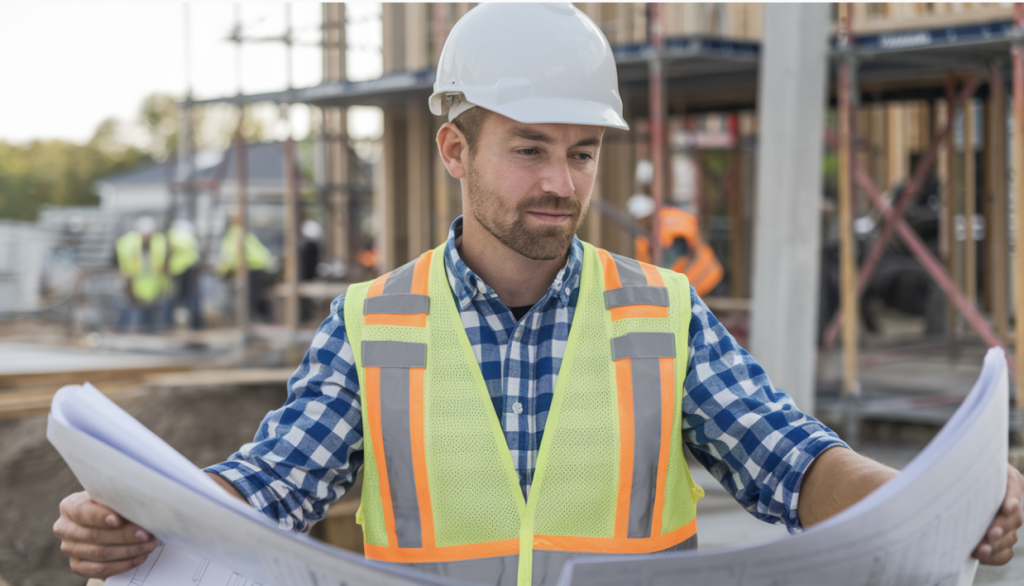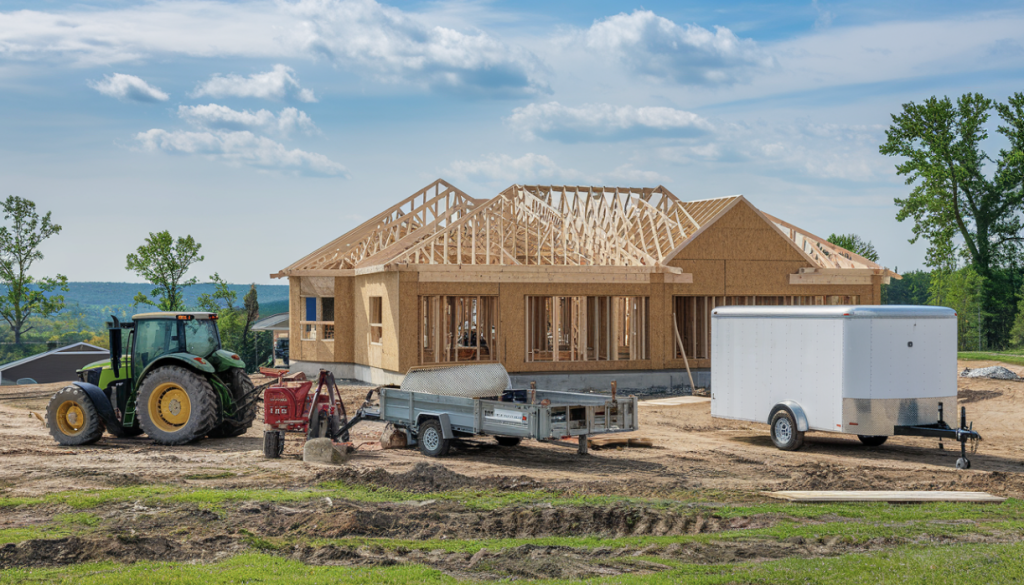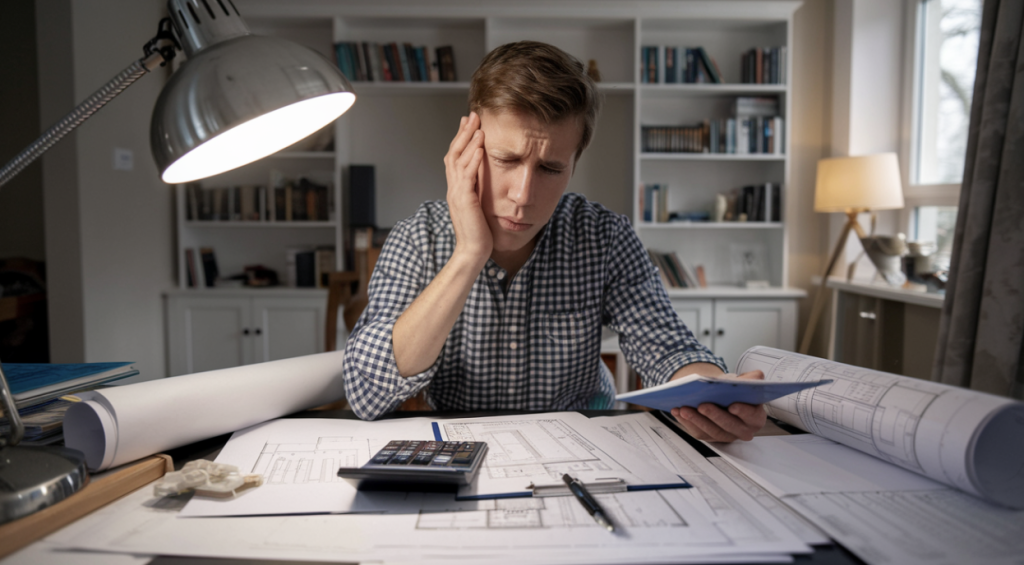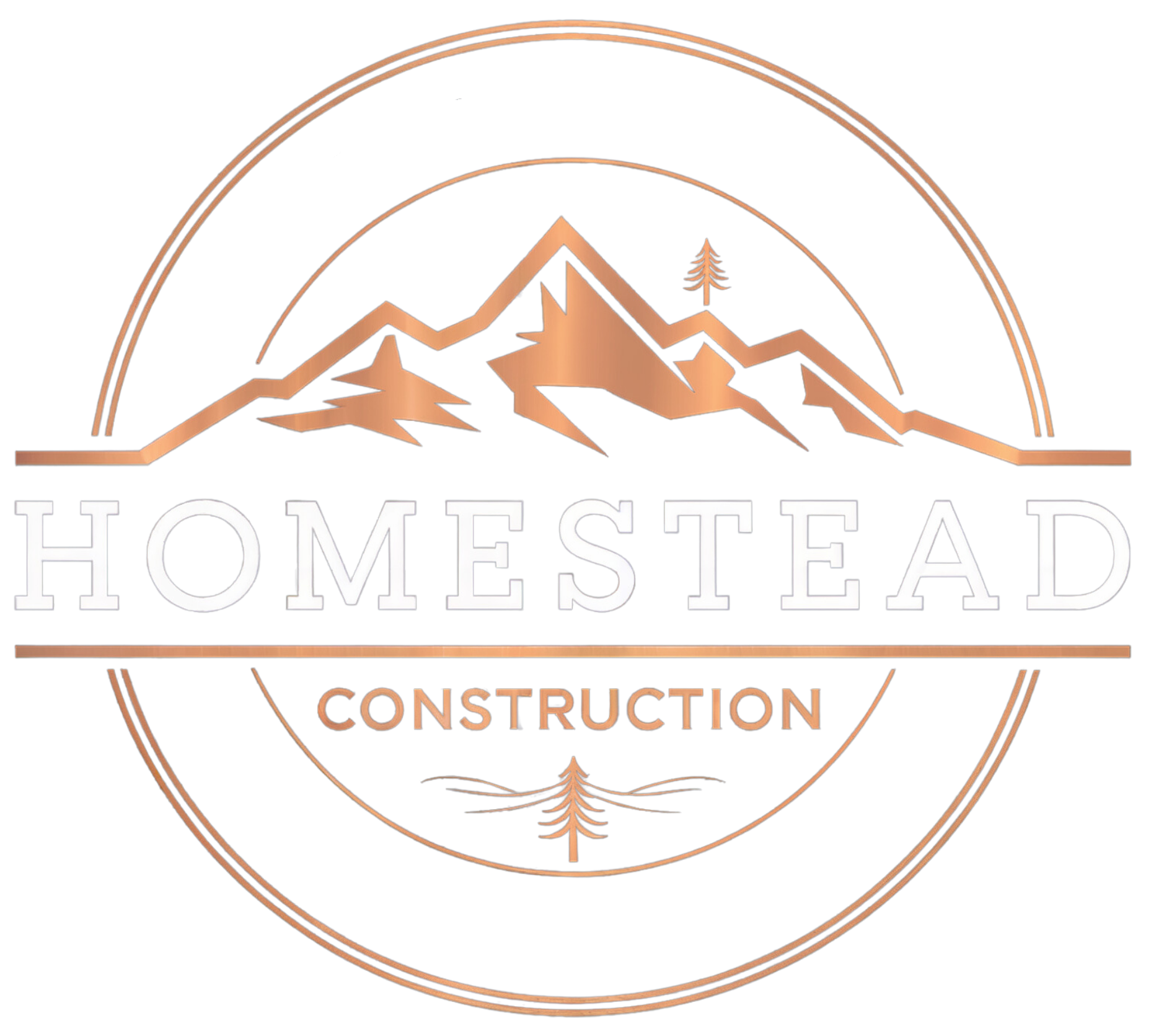
Smart Ways to Explore Custom Home Financing Options

So, you’ve got the dream. The perfect custom home, designed just the way you want it—open-concept kitchen, energy-efficient upgrades, maybe even a heated garage for winter mornings. But here’s the big question: how do you pay for it?
That’s where custom home financing options come in. Unlike buying a pre-built home with a traditional mortgage, building your own requires special financing—construction loans, land loans, and other financing programs. Whether you’re working with a builder or taking the DIY route, getting the right loan makes all the difference in bringing your dream home to life without financial headaches.
At Homestead Construction, we’ve seen it all—budgeting mistakes, lender rejections, unexpected costs—and we help homeowners find the best loans for building a home while keeping costs under control. This guide breaks down everything you need to know about how to finance a custom home, including:✅ Construction loans vs. mortgages—what’s the difference?
✅ Best financing options for custom home construction
✅ How your credit score impacts loan approval
✅ Hidden costs and budgeting tips for a smooth build
✅ Government-backed programs that can save you thousands

Custom Home Financing Options: Loan Types Explained
So, you’re ready to build your dream home—but you’ve run into a problem. Your lender is talking in circles about “construction loan vs mortgage” options, interest rates, and loan terms that sound more complicated than assembling a backyard shed.
The truth is, financing a custom home is a completely different ballgame from buying an existing house. Most people just walk into a bank, get a traditional mortgage, and move in. But when you’re building from scratch? You need a financing plan that covers everything—land, materials, labor, and the months of construction before the house is even livable.
Why You Need Custom Home Financing Options Instead of a Standard Mortgage
A standard mortgage is based on a home that already exists. Lenders use its market value, condition, and comparable sales to determine how much they’ll loan you. But with a custom home? There’s nothing to appraise yet!
That’s why custom home financing options are designed to fund the build in stages. Instead of one lump sum, the lender releases money in draws—paying the builder as construction progresses. This ensures:
✅ Contractors get paid as work is completed
✅ Homeowners don’t pay interest on the full amount upfront
✅ Banks reduce risk by making sure the home is actually built

Which Custom Home Financing Option Is Right for You?
Not all loans are created equal, and choosing the wrong one can leave you paying higher interest rates or unnecessary fees. Here’s a breakdown of the best loans for building a home and how they work.
1️⃣ Construction Loans: A Key Custom Home Financing Option
A construction loan is a temporary loan that covers the cost of building a home from the ground up. Once the home is finished, the loan must be paid off or converted into a permanent mortgage.
✔️ Higher interest rates (since it’s short-term financing)
✔️ Paid in stages—lender releases money as the project progresses
✔️ Requires a detailed construction plan & contractor approval
Best for: Homeowners who need flexible, short-term funding before getting a mortgage.
2️⃣ Why Construction-to-Permanent Loans Are a Smart Custom Home Financing Option
If you don’t want to deal with two separate loans, this is a great option. A construction-to-perm loan starts as a construction loan and automatically converts into a traditional mortgage once the home is complete.
✔️ Lower closing costs (since there’s only one loan process)
✔️ Interest-only payments during construction
✔️ Lock in a fixed interest rate upfront
Best for: Homeowners who want a seamless transition into a mortgage after the build is complete.
3️⃣ Traditional Mortgages vs. Custom Home Financing Options: What’s Best?
Not every custom home project starts from scratch. If you’re buying a home that’s already under construction or working with a builder on a semi-custom home, you may qualify for a traditional mortgage instead.
✔️ Lower interest rates compared to construction loans
✔️ Faster approval process since there’s a physical home to appraise
✔️ No need for a short-term construction loan
🏡 Best for: Buyers purchasing a spec home or builder-financed property that’s nearing completion.
How Lenders Evaluate Custom Home Financing Options for Loan Approval
Securing financing isn’t just about choosing the right loan type—it also depends on your financial profile. Lenders look at several key factors before approving a custom home loan.
🔹 Credit Score: Higher scores (typically 680+) get better interest rates and loan terms.
🔹 Debt-to-Income Ratio (DTI): Lenders want to see your monthly debts below 43% of your income.
🔹 Down Payment: Most construction loans require 20–25% down (though government-backed options may allow lower amounts).
Finding the Right Financing for Your Custom Home
Figuring out how to finance a custom home may seem overwhelming, but the right loan makes all the difference. Whether you go with a construction loan, construction-to-perm, or traditional mortgage, the key is to work with lenders who specialize in custom home financing options.
At Homestead Construction, we help homeowners find the best financing strategies by:
✅ Connecting you with trusted lenders who specialize in new home construction
✅ Providing cost estimates and budgeting advice to avoid surprises
✅ Ensuring your loan is structured correctly so you’re not overpaying
Best Custom Home Financing Options for Every Budget
Alright, we’ve talked about how to finance a custom home, and by now, you know that a traditional mortgage won’t cut it for new construction. But here’s where things get interesting—you actually have several loan options, and choosing the right one can save you thousands in interest, fees, and headaches.
At Homestead Construction, we’ve worked with all types of financing and know which loans work best for different homebuyers. Whether you’re hiring a builder or managing the construction yourself, let’s break down the best loans for building a home and how to pick the right one for your project.

1. Owner-Builder Loans: A Unique Custom Home Financing Option
If you’re a hands-on homeowner who wants to act as your own general contractor, an owner-builder loan is worth considering. This loan gives you direct control over construction, meaning you can hire subcontractors, purchase materials, and oversee the project—all while financing it with lender-approved funds.
✅ Key Features of Owner-Builder Loans:
✔️ Funds paid in installments (just like a standard construction loan).
✔️ You must prove experience in construction or hire a licensed builder to assist.
✔️ Stricter lender requirements—higher credit scores and larger down payments.
Best for: Experienced homebuilders who want to manage their own construction and save money on contractor fees.

2. Lot Loans: An Essential Custom Home Financing Option
Got the perfect piece of land but not ready to start building yet? A lot loan lets you buy the land first and secure financing for construction later.
✅ Lot Loan Benefits:
✔️ Covers raw or developed land purchases.
✔️ Allows time to finalize home design and permits before securing a construction loan.
✔️ Some lenders allow rollovers into construction-to-perm loans.
Best for: Homebuyers who found the perfect lot but need more time before starting construction.
3. End Loans: A Critical Piece of Custom Home Financing Options
An end loan is a standard mortgage that kicks in once construction is complete. If you started with a construction loan, you’ll need an end loan to pay off the balance once your home is built.
✅ End Loan Benefits:
✔️ Lower interest rates compared to construction loans.
✔️ Provides long-term financing for custom homes.
✔️ Allows homeowners to shop around for better mortgage rates.🏡 Best for: Homeowners who used short-term construction financing and need permanent mortgage options.
4. FHA Construction Loans: A Custom Home Financing Option with Low Down Payments
If you’re worried about the 20–25% down payment required for most construction loans, an FHA construction loan may be a great alternative. These government-backed loans allow lower down payments and more flexible credit requirements.
✅ FHA Construction Loan Features:
✔️ Low down payment (as little as 3.5%).
✔️ Available to first-time homebuyers and those with lower credit scores.
✔️ Must meet FHA home construction and safety guidelines.
Best for: Homebuyers who need lower down payments and government-backed loan options.
5. Government-Backed Custom Home Financing Options: VA & USDA Loans
Certain buyers don’t need a down payment at all. If you qualify for a USDA loan (for rural homes) or a VA loan (for military veterans), you could finance your custom home with zero money down.
✅ USDA & VA Loan Perks:
✔️ 0% down payment (no large upfront costs).
✔️ Lower interest rates than conventional loans.
✔️ Must meet eligibility requirements for rural properties (USDA) or military service (VA).
Best for: Veterans, active-duty military, or buyers looking to build in rural areas.
Which Loan is Right for You?
🏗️ Construction Loan: Best for funding a build from start to finish.
🛠️ Owner-Builder Loan: Great for hands-on homeowners managing their own build.
🌲 Lot Loan: Ideal if you found the perfect land but aren’t ready to build.
🏠 End Loan: Used for paying off a construction loan once the home is complete.
🏡 FHA Construction Loan: Low-down-payment option for buyers with limited savings.
🇺🇸 USDA & VA Loans: Best for eligible buyers needing zero-down financing.
Budgeting Tips to Maximize Custom Home Financing Options
So, you’ve picked the perfect financing option for your custom home—now it’s time to talk dollars and cents. If there’s one thing we’ve learned at Homestead Construction, it’s this: building your dream home is an amazing investment, but if you don’t plan your budget right, it can become a financial nightmare.
Custom homes aren’t one-size-fits-all, and neither are their price tags. Whether you’re working with a tight budget or splurging on high-end luxury, smart budgeting keeps your home build on track and your wallet happy.

1. How Custom Home Financing Options Cover Construction Costs
The cost of building a home depends on several factors, including size, materials, labor, location, and extra features. Let’s look at the biggest expenses homeowners need to plan for.
✅ Cost Breakdown for a Custom Home:
✔️ Land Purchase & Preparation – $50,000–$300,000+ (depending on location and lot size).
✔️ Permits & Fees – $5,000–$30,000 (zoning, inspections, impact fees).
✔️ Foundation & Framing – $40,000–$120,000 (the bones of the house).
✔️ Plumbing & Electrical – $30,000–$60,000 (bringing in power and water).
✔️ HVAC & Energy Efficiency – $15,000–$50,000 (heating, cooling, and insulation).
✔️ Interior Finishes & Appliances – $50,000–$200,000 (kitchens, bathrooms, flooring, and fixtures).
✔️ Landscaping & Exterior Work – $10,000–$100,000 (driveways, porches, outdoor spaces).
2. Avoiding Hidden Fees in Custom Home Financing Options
Surprise! There are always hidden costs when building a home. If you don’t plan for them, they can derail your budget fast.
❌ Common Unexpected Costs:
🚧 Soil Testing & Land Prep – Rocky soil or bad drainage? That’s an extra $5,000–$20,000.
🏗️ Upgraded Materials – That high-end quartz countertop you fell in love with? Add another $5,000.
🔌 Technology & Smart Home Features – AI-powered thermostats and security systems? $10,000+ for the full setup.
Delays & Labor Costs – Bad weather or supply chain delays? Budget an extra 10–20% for unexpected labor.
The Result? Always build in a contingency fund (typically 10–15% of your total budget) for unplanned expenses.

3. How to Optimize Custom Home Financing Options to Save Money
Building a home doesn’t mean breaking the bank—smart choices can shave thousands off your total cost without compromising quality.
✅ Budget-Friendly Custom Home Tips:
✔️ Simplify the Floor Plan – Fewer corners and curves mean lower framing costs.
✔️ Use Cost-Effective Materials – Luxury finishes look great, but mid-range materials offer similar style at half the price.
✔️ Go Energy-Efficient – High-efficiency appliances and solar panels cut long-term utility costs.
✔️ DIY Where You Can – Landscaping, painting, and minor finishes can save you thousands.
The Result? Strategic budgeting ensures you get the most home for your money without sacrificing the features you love.
4. How Lenders Help Tailor Custom Home Financing Options to Your Budget
Your lender wants to know one thing before approving a loan: Can you afford it? Before breaking ground, sit down with your bank or mortgage broker to determine a realistic budget.
📋 What Lenders Look For:
✔️ Loan-to-Value Ratio (LTV) – The percentage of the home’s cost that your loan covers.
✔️ Debt-to-Income Ratio (DTI) – Lenders prefer a DTI below 43% for loan approval.
✔️ Your Down Payment – The more you put down upfront, the lower your monthly mortgage payments.
The Result? A well-planned budget means a smoother loan approval process and a home that fits your financial goals.
5. Payment Schedules in Custom Home Financing Options
With a traditional home purchase, you get a mortgage and pay in monthly installments. With custom home financing options, it works a little differently.
🏗️ Payment Timeline for Custom Homes:
✔️ Loan Approval & Down Payment – Before construction begins.
✔️ Site Prep & Foundation – First draw from the loan (10–15% of total cost).
✔️ Framing & Major Systems – Additional payments as work progresses.
✔️ Interior & Finishes – Final loan draw before move-in.
The Result? Construction loans release funds in phases, so planning payments in advance keeps the project moving.
Smart Budgeting Leads to a Stress-Free Home Build
Building a home is one of the biggest financial investments you’ll make, and getting the budget right from the startcan save you money, stress, and delays.
✅ Key Takeaways:
✔️ Know your total costs—land, labor, permits, and finishes all add up.
✔️ Plan for hidden expenses—surprises happen, so set aside a contingency fund.
✔️ Work with a lender to establish a realistic construction budget.
✔️ Stick to your budget—but be flexible enough to handle necessary upgrades.

How Credit Scores Affect Custom Home Financing Options
Alright, so you’ve got big plans for your custom home—but before you start picking out countertops and debating between a walk-in pantry or a bigger mudroom, you need to make sure the bank actually approves your loan.
Here’s the deal: lenders don’t just hand out money to anyone with a blueprint. They need to be 100% sure you can handle the financial responsibility of building a home from scratch. That’s why they scrutinize your credit score, debt-to-income ratio, and down payment ability before saying, “Yes, we’ll fund your dream home.”
Let’s break down exactly what lenders look for, how to qualify for the best financing options, and what to do if your credit isn’t perfect.
1. Credit Score: How High Does It Need to Be?
Your credit score is one of the biggest factors in determining whether you qualify for a construction loan or mortgage. It tells lenders how responsible you are with debt, and higher scores mean better loan terms, lower interest rates, and a smoother approval process.
✅ Minimum Credit Score Requirements for Custom Home Loans:
✔️ Conventional Construction Loans: 680+ (Some lenders prefer 700+)
✔️ FHA Construction Loans: 580+ (with 3.5% down)
✔️ VA & USDA Loans: 620+ (zero down payment)
✔️ Jumbo Construction Loans: 720+ (for luxury homes over loan limits)🏡 The Result? A higher credit score = lower interest rates and better loan terms, saving you thousands over the life of your mortgage.
2. Debt-to-Income Ratio: A Key Factor in Custom Home Financing Options
Even if your credit score is solid, lenders also look at your Debt-to-Income Ratio (DTI). This measures how much of your monthly income goes toward paying off debt—and lenders want to make sure you’re not in over your headbefore approving a construction loan.
✅ Ideal DTI for Construction Loan Approval:
✔️ Below 36% DTI – Best chance for approval, great interest rates.
✔️ 36%–43% DTI – Acceptable, but you might get a slightly higher rate.
✔️ Above 43% DTI – Lenders may reject your loan or require a larger down payment.
The Result? If your DTI is too high, paying off existing debt before applying can improve your chances of loan approval.

3. Down Payment Requirements: How Much Do You Need?
Unlike traditional mortgages, construction loans typically require larger down payments—because lenders see them as higher risk.
✅ Construction Loan Down Payment Requirements:
✔️ Conventional Construction Loan: 20%–25% down
✔️ FHA Construction Loan: 3.5% down (with 580+ credit score)
✔️ VA & USDA Loans: 0% down (for eligible borrowers)
✔️ Jumbo Construction Loan: 30%+ down (for high-value properties)
The Result? The more you put down, the lower your loan balance and monthly payments.
4. Boosting Credit to Secure Better Custom Home Financing Options
If your credit score isn’t quite where you want it to be, don’t panic—there are several ways to boost it before applying for a construction loan.
✅ Steps to Improve Your Credit Score:
✔️ Pay down high balances – Credit utilization over 30% hurts your score.
✔️ Make all payments on time – Even one late payment can drop your score.
✔️ Avoid opening new credit lines – Hard inquiries can lower your score temporarily.
✔️ Check for errors on your credit report – Dispute any incorrect information.
The Result? A higher credit score means lower interest rates and better loan options.
5. Pre-Approval: The First Step to Securing Custom Home Financing Options
Before you even break ground, you need loan pre-approval to ensure you qualify for financing.
✅ Why Get Pre-Approved?
✔️ Shows lenders you’re a serious borrower
✔️ Sets a realistic home budget before you design your home
✔️ Speeds up the loan approval process once construction starts
The Result? Getting pre-approved for a loan eliminates surprises and ensures you can secure financing when you’re ready to build.
Get Your Finances in Order Before You Build
Lenders want to know you’re financially prepared to take on a custom home construction loan. The better your credit score, debt-to-income ratio, and down payment, the better loan terms you’ll qualify for.
✅ Key Takeaways:
✔️ Higher credit scores get better rates – Aim for 680+ for conventional loans.
✔️ Keep DTI below 43% – Lower debt increases loan approval chances.
✔️ Down payments vary – Expect 20%+ for most loans, but FHA & VA offer lower options.
✔️ Pre-approval speeds up the process – Know your budget before designing your home.
Government Loans & Incentives for New Home Construction
So, you’re building a custom home, and financing it the right way is key to keeping costs under control. But here’s something a lot of folks don’t realize—you might qualify for government-backed loans or financial incentives that make the process easier and more affordable.
That’s right! Whether you’re a first-time homebuyer, a veteran, or building an energy-efficient home, there are federal and state programs designed to help lower your costs, reduce your down payment, and even offer tax incentives.
Let’s break down some of the best government-backed financing options and incentives for building a custom home.

1. FHA Construction Loans: Low-Down-Payment Financing 🏡💰
If you don’t have a huge down payment saved up, an FHA construction loan can be a lifesaver. Backed by the Federal Housing Administration, this loan allows you to finance both the construction and the final mortgage with as little as 3.5% down.
✅ Why Consider an FHA Construction Loan?
✔️ Low down payment – Only 3.5% down (compared to 20–25% for standard construction loans).
✔️ Easier qualification – Credit score requirements start at 580+.
✔️ One-time close loan – Converts into a regular mortgage once the home is built.
Best for: First-time homebuyers or those who need a lower down payment option.
2. VA Construction Loans: Zero-Down Financing for Veterans 🇺🇸🏗️
For active-duty service members, veterans, and eligible military families, a VA construction loan offers zero-down financing—meaning you could build your home without putting a single dollar down.
✅ Why Choose a VA Construction Loan?
✔️ 0% down payment – No need to save up thousands in cash.
✔️ No private mortgage insurance (PMI) – Lowers your monthly payment.
✔️ Competitive interest rates – Typically lower than conventional construction loans.
Best for:Veterans and active-duty military looking for affordable custom home financing.

3. USDA Construction Loans: Rural Home Financing with No Down Payment 🌲🏡
Thinking about building in a rural or suburban area? The USDA Construction Loan program—backed by the U.S. Department of Agriculture—offers zero-down financing for eligible locations.
✅ Perks of a USDA Construction Loan:
✔️ 0% down payment – Like the VA loan, you don’t need to put any money down.
✔️ Lower mortgage insurance costs than conventional loans.
✔️ Designed for rural and suburban areas (Check if your location qualifies).
Best for: Buyers building in eligible rural or suburban areas who want zero-down financing.
4. Energy-Efficient Home Grants & Tax Incentives 🌍🔋
If you’re building a custom home with energy-efficient features, you may qualify for state and federal tax credits, rebates, and grants.
✅ Energy-Efficient Incentives You Should Know About:
✔️ Federal Tax Credits for Solar Panels – Covers up to 30% of installation costs for solar energy systems.
✔️ Energy-Efficient Mortgage (EEM) – Lets you borrow extra funds to make your home more energy-efficient.
✔️ State & Local Utility Rebates – Some areas offer cash-back programs for installing energy-efficient windows, appliances, or HVAC systems.
Best for: Homeowners planning to include solar panels, energy-efficient HVAC, or smart home technology in their new build.
5. State & Local Homebuyer Assistance Programs 🏡🏦
Beyond federal programs, many states and cities offer homebuyer assistance grants, tax breaks, and low-interest loans for building or buying a home.
✅ How to Find Local Incentives:
✔️ State Housing Agencies – Many states offer down payment assistance for custom home construction.
✔️ Municipal Development Grants – Some cities offer grants for building in designated redevelopment zones.
✔️ First-Time Homebuyer Incentives – Programs designed to help new buyers afford their first home build.
Best for: Homebuyers looking for location-specific grants or incentives to lower costs.
Are You Eligible for Government Financing?
If you’re building a custom home, there’s a good chance you qualify for some form of government-backed assistance, whether it’s a low-down-payment loan, tax credits, or homebuyer incentives.
✅ Key Takeaways:
✔️ FHA loans – Great for low-down-payment financing.
✔️ VA & USDA loans – Offer zero-down financing for eligible buyers.
✔️ Energy-efficient incentives – Tax credits and grants for green home features.
✔️ State & local assistance – Check your state for extra homebuyer support.
How Homestead Construction Helps You Navigate Financing
So, you’ve got the dream home in mind, you’ve explored custom home financing options, and maybe even found some government-backed incentives to help. But now comes the tricky part—navigating the financing process without losing your mind.
Here’s the good news: You don’t have to do it alone.
At Homestead Construction, we’ve helped countless homeowners find the best loans, budgeting strategies, and cost-saving incentives to make their dream home a reality. From securing pre-approvals to working with trusted lenders, we ensure that every homeowner gets the financing that fits their goals and budget.
Let’s walk through exactly how we help you navigate the financial side of building a custom home—without the stress.

1. Helping You Choose the Right Loan for Your Home Build 🏡💰
Not all custom home financing options are created equal. Choosing the wrong loan can lead to higher interest rates, unnecessary fees, and financing delays that slow down your build.
At Homestead Construction, we work closely with you to understand:
✅ Your budget & income—so you don’t take on more than you can afford.
✅ Your financing goals—low down payment? Best interest rate? We help you find the right fit.
✅ Your credit score & loan qualifications—so you apply for loans you’ll actually qualify for.
The Result? You don’t waste time applying for the wrong loan, and you get financing that matches your financial situation and home-building goals.
2. Connecting You with Trusted Lenders & Mortgage Brokers 🏦🔑
Not all lenders specialize in construction loans, and the wrong lender can slow down your project or add unnecessary costs.
That’s why we only work with lenders who understand:
✔️ Construction-to-perm financing—so your loan seamlessly transitions into a mortgage.
✔️ Draw schedule loans—so your builder gets paid on time and keeps the project moving.
✔️ Specialized government-backed loans—so you don’t miss out on FHA, VA, or USDA benefits.
The Result? You get financing from a lender who understands your project and keeps the process on track and stress-free.

3. Budgeting Assistance to Keep Your Home Build on Track 📊🏗️
One of the biggest pitfalls in custom home construction is underestimating costs. Overruns can add thousands to your budget, and if you haven’t planned properly, you could run out of funds before the home is complete.
We help you plan for every expense, including:
✔️ Land prep & site costs—permits, zoning, and grading.
✔️ Construction materials & labor—what’s realistic for your budget?
✔️ Hidden costs & overruns—so you’re prepared for surprises.
The Result? Your home stays on budget, on schedule, and fully funded until the final brick is laid.
4. Assisting with Pre-Approval & Loan Applications 📝✅
If you’ve ever applied for a mortgage, you know loan paperwork can feel overwhelming. Construction loans? Even more complex.
We help by:
✔️ Explaining pre-approval requirements so you know exactly what you need.
✔️ Gathering the right documents (income verification, credit reports, tax returns, etc.).
✔️ Connecting you with lenders who streamline the approval process.
🏡 The Result? Faster loan approvals, fewer financing delays, and a hassle-free experience.
5. Helping You Secure Grants, Incentives & Tax Credits 💵🏡
Did you know you could qualify for grants, tax incentives, or down payment assistance for your custom home? Many homeowners miss out on thousands of dollars in savings simply because they didn’t know these programs exist.
We help you:
✔️ Find energy-efficiency tax credits for solar panels, smart thermostats, and green building materials.
✔️ Apply for state and local homebuyer assistance grants.
✔️ Maximize government-backed loan programs like FHA, VA, and USDA financing.
The Result?More money in your pocket and a home that’s cheaper to build and maintain.
6. Providing Financial Guidance Throughout the Build 🏠📆
Financing a custom home doesn’t stop once your loan is approved—it continues through every stage of the build.
At Homestead Construction, we stay with you from start to finish, helping you:
✔️ Stick to your budget and avoid unnecessary upgrades.
✔️ Make smart financial decisions when choosing materials and finishes.
✔️ Ensure payments are released on time so your builder stays on schedule.
The Result? A stress-free home build where you never have to worry about financing issues slowing things down.
Let’s Build Your Dream Home—The Smart Way
Building a custom home is one of the biggest financial investments you’ll ever make. Having the right financing strategy in place ensures that the process is smooth, affordable, and stress-free.
At Homestead Construction, we help you find the best financing, manage your budget, and avoid common financial pitfalls so you can build the home you’ve always wanted—without the financial stress.
✔️ Choose the right loan – We help match you with the best construction loan or mortgage.
✔️ Work with trusted lenders – Ensuring your financing stays on track.
✔️ Plan a realistic budget – So your home stays on time and fully funded.
✔️ Maximize tax credits & incentives – Saving you thousands in homebuyer benefits.
Ready to start your custom home journey? Contact Homestead Construction today for a free financing consultation!
